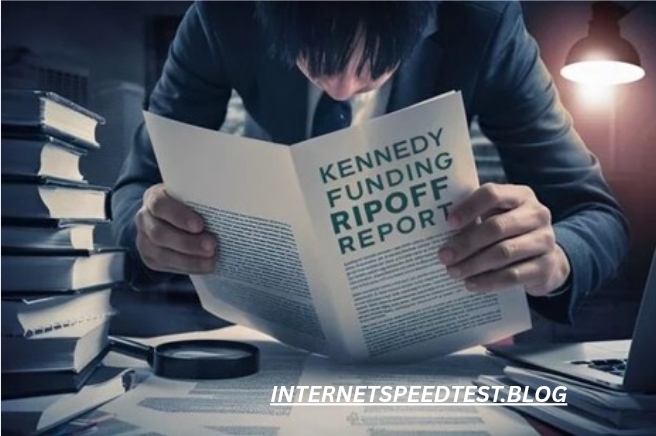Introduction
Borrowers navigating private lending avenues often stumble across reports and complaints that raise red flags. Among these, the term “Kennedy Funding Ripoff Report” frequently appears—online posts where unsatisfied clients voice concerns about high fees, shifting loan terms, and poor communication. But what exactly lies behind these complaints? This comprehensive article examines the recurring allegations, Kennedy Funding’s responses, steps taken internally, and most importantly, how borrowers can protect themselves.
1. What Is the “Kennedy Funding Ripoff Report”?
Ripoff Report is a public complaint platform where individuals can post grievances against companies without gatekeeping or verification of claims. As such, the “Kennedy Funding Ripoff Report” refers to a collection of these postings by individuals who allege they had negative experiences with Kennedy Funding .
Because the site is open to public submissions, the content varies in validation and tone—some reports may be based on genuine miscommunication, while others might exaggerate isolated issues.
2. Common Allegations Highlighted in Ripoff Reports
Hidden or Excessive Upfront Fees
Many borrowers allege that Kennedy Funding charged hefty non-refundable fees—such as appraisal, legal, or due diligence fees—even if the loan never closed . Some claim fees ranged widely, and they were unaware these costs would apply if funding did not materialize .
Loan Approvals That Never Materialize or Change Midway
Another frequent complaint: borrowers say they received verbal or conditional approvals only to find the loan terms altered last minute, or funding withdrawn altogether. Such instances foster the perception of bait‑and‑switch tactics .
Lack of Transparency and Shifting Terms
Reports frequently criticize a lack of transparency, with critics pointing to vague contract language, hidden costs, or changes to interest rates and repayment schedules after agreements were initiated .
Slow or Poor Communication
Complaints around communication abound: borrowers cite unreturned emails, delayed responses, and general difficulty getting clear guidance throughout the loan process .
Funding or Disbursement Delays
Despite Kennedy Funding’s branding as a fast alternative to banks, some borrowers report that disbursements were delayed, jeopardizing time-sensitive deals and causing significant financial strain .
Aggressive Collection or Legal Responses
A number of posts assert that Kennedy Funding responded combatively to criticism—some borrowers claim they were threatened with legal action or pressured to remove unfavorable reviews .
3. Kennedy Funding’s Official Position and Response
Kennedy Funding has consistently denied allegations of predatory or deceptive practices. The company maintains that fees are standard in private lending and clearly documented, intended to cover administrative and risk-related costs .
They emphasize their experience in closing complex or high-risk loans that traditional banks avoid, positioning themselves as a solution for challenging financing situations .
Internal efforts to improve transparency include revamping fee disclosures, clarifying loan agreements, conducting internal audits, and educating borrowers about terms and risks .
4. Data Snapshot: Complaints vs. Responses (2020–2025)
An analysis of complaints between 2020 and 2025 shows several clear patterns:
- Hidden or excessive fees account for roughly 40% of complaints.
- Poor communication constitutes about 25%.
- Loan term manipulation is around 20%.
- Transparency concerns fill the remaining 15% .
The company reportedly spent approximately £7.94 million defending against lawsuits, with potential settlements estimated between £39.7 million and £59.5 million . While financial pressure has led to policy revisions, complaints have persisted into 2025, driving increased regulatory oversight .
5. Insider Testimonies: Shedding Light on Internal Practices
Former employees—reporting anonymously—share troubling insights:
- Only about 20% of loan commitments between 2001 and 2006 actually closed .
- Staff admissions suggest that fee collection often takes priority over completing deals—some acknowledged continuing to collect fees even when loans were unlikely to close .
- Internal processes may involve evaluating “cash sale” values with steep discounts, reducing actual funding potential for borrowers—details not shared transparently .
- Quotes like “we’re not very good at running [a property]” reflect discomfort with actual operations, which may explain a preference for collecting fees rather than managing foreclosures .
These internal leaks suggest that some borrowers’ worst fears may have grounding in actual practices.
6. Is Kennedy Funding Just Another Hard Money Lender—or Something More?
Hard Money Lending Context
Hard money lenders typically offer quick, asset-based financing for high-risk or nontraditional borrowers. These loans come with high interest rates (often 9–18%), origination points, and fees to cover expedited processing and risk .
Where Kennedy Funding Stands
Kennedy Funding claims to operate within this model—catering to land deals, foreign transactions, or borrowers with poor credit—where traditional financing isn’t viable .
When Concerns Arise
The red flags emerge when:
- Fee disclosures are incomplete or one‑sided.
- Loan terms shift post‑agreement in ways that disadvantage borrowers.
- Communication after fee payment breaks down.
- Loans don’t actually close, yet fees are retained.
- Legal pressure or intimidation replaces resolution.
These issues suggest not all complaints are about the model itself—but about implementation, transparency, and borrower treatment.
7. Steps Borrowers Can Take to Protect Themselves
If you’re considering a loan through Kennedy Funding—or any private lender—follow this checklist to safeguard your interests:
Do Thorough Pre-Deal Research
- Look for credible reviews on platforms like Ripoff Report, Better Business Bureau, or Trustpilot, weighing both complaints and responses .
- Investigate regulatory status and licensing—verify they comply with applicable laws in your jurisdiction .
Insist on Full Fee Transparency and Documentation
- Get a detailed breakdown of all fees—appraisal, due diligence, origination, prepayment penalties, etc.—and ask specifically whether they’re refundable if the deal fails .
- Avoid verbal assurances alone—make sure everything is in writing .
Engage Independent Advisors
- Have an attorney or financial advisor review loan documents before signing.
- Ensure you understand refund policies, default consequences, and term flexibility .
Set Realistic Timelines and Confirm Disbursement Plans
- Ask for formal timelines for approval and funding, and what happens if delays arise.
- Build in contingency time if the funding is critical to your project .
Compare Multiple Lenders
- Evaluate offers from at least two or three sources—including banks, credit unions, and peer‑to‑peer platforms—to benchmark costs and terms .
Monitor Communication and Escalate When Needed
- Keep records of all correspondence and ask for escalation options if communication stalls.
- Clarify expectations up front for updates on status, changes, or potential issues.
8. Final Thoughts and Balanced Perspective
The Kennedy Funding Ripoff Report isn’t proof of fraud—but it’s a powerful collection of cautionary tales. Many borrowers allege hidden fees, shifting terms, funding delays, and poor communication. These issues appear systemic, not just random frustrations, especially given persistent complaints and legal pressures .
Yet, Kennedy Funding continues operating and points to a portfolio of successful closings, efforts to improve disclosure, and infrastructure modifications to address prior gaps .
Whether you view them as a necessary private lender serving niche needs—or as a lender leaning too heavily on fees while avoiding closures—the truth likely lies in the middle. Kennedy Funding fills a space banks often won’t touch, but the conduct of any borrower’s experience depends on how well you enter, understand, and monitor the process.
Conclusion
The “Kennedy Funding Ripoff Report” is a term loaded with sentiment—representing both genuine grievances and warnings to proceed with caution. While some borrowers may have had positive experiences, the sheer volume and consistency of the issues surface a broader pattern of transparency and execution challenges.
If you’re exploring hard money or bridge financing:
- Research thoroughly.
- Demand clarity and documentation.
- Get independent review.
- Compare alternatives.
- Maintain active communication.
A well-informed borrower is a protected borrower—and when it comes to private lenders like Kennedy Funding, that may be your best safeguard against cost surprises and funding pitfalls.
I hope you find this article useful. Let me know if you’d like a different tone, section breakdown, or additional word count!




